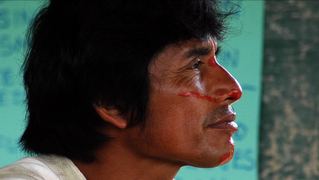
Guests
- Marly Anzualdo Castroher brother, Kenneth Anzualdo Castro, was disappeared in 1993 during the reign of Fujimori.
The U.N. climate summit in Lima is being held at the Peruvian army headquarters, known as “El Pentagonito.” It is a site with a dark history, built in 1975 by the dictator Juan Velasco Alvarado. The army, under President Alberto Fujimori, later used the base to torture and interrogate political prisoners. We speak with Marly Anzualdo Castro, whose brother, Kenneth Anzualdo Castro, was disappeared in 1993 during Fujimori’s reign. Last year, the Inter-American Court of Human Rights determined the state was responsible for Kenneth’s forced disappearance. To this date, his whereabouts remain unknown. Anzualdo Castro joined Wednesday’s climate march in Lima holding a sign reading “No Olvidamos,” which means “We don’t forget.” Anzualdo Castro says her brother was committed to student activism. “I join young people today [at the climate protest] because my brother had that spirit,” Anzualdo Castro says. “So for me it is a way to see him alive now.”
Transcript
AMY GOODMAN: Yes, we are broadcasting from the COP 20. The summit is being held at the Peruvian army headquarters, known as “El Pentagonito.” It’s a site with a dark history. It was built in 1975 by the dictator Juan Velasco Alvarado. The army, under President Alberto Fujimori, later used the base to torture and interrogate political prisoners.
One of the people who joined the march against the World Climate Summit on Wednesday was Marly Anzualdo Castro, who held a sign reading “No Olvidamos,” “We don’t forget,” with a picture of El Pentagonito. Her brother, Kenneth, was disappeared in 1993 during the reign of Fujimori. Last year, the Inter-American Court of Human Rights determined the state was responsible for his forced disappearance. The court found state agents kidnapped Anzualdo Castro and brought him to the basement of Peru’s Army Intelligence Service, known as SIE, located here at El Pentagonito. To this date, his whereabouts remain unknown. On Wednesday, Marly Anzualdo Castro spoke to Democracy Now!’s Renée Feltz.
MARLY ANZUALDO CASTRO: [translated] My name is Marly Anzualdo Castro. I’m the sister of Kenneth Anzualdo Castro. He was a student who disappeared 21 years ago in the Pentagonito. I’m also here because they are murdering nature, and also because the peasant leaders who are struggling for water are also being killed. The same thing happened years ago, when young people fought for student welfare and opposed what the government did at that time. They were kidnapped and disappeared. Currently, there is a trial in the criminal division of the Callao naval base for the forced disappearance of two students, including my brother, and a teacher who was a professor at the University of San Cristóbal de Huamanga of Ayacucho.
RENÉE FELTZ: Can you tell us what exactly happened to your brother, and why was he targeted?
MARLY ANZUALDO CASTRO: [translated] During the 1980s to 2000, Peru went through an internal armed conflict. Students, especially from public universities, were considered potential terrorists. My brother offered to be a witness around the case of the disappearance of a young man named Martín Roca Casas. Two days before going to testify in front of the district attorney, my brother disappeared. It was December 16th, 1993. This year, it will be 21 years. He was a young man committed to student activism at the university and to reclaiming the rights of the people. So I join young people today, because my brother had that spirit. So, for me, it is a way to see him alive now. And that is my motivation to be here today, and even more, because of the water, the Earth, life.
RENÉE FELTZ: Can you tell us how you feel about the COP being hosted in the shadow of El Pentagonito and the police here behind you?
MARLY ANZUALDO CASTRO: [translated] Yes, knowing about it made me feel very outraged. I was all ready outraged before, because the site became a place where fashion shows were happening. It became a place for concerts. Actually, this made me feel helpless and angry, because the government did this even after discovering a furnace where people were cremated. A human remain was found there, too. It was the right-hand phalanx finger of a person about 25 years old. And that was precisely the average age of the young people who had disappeared—students.
Now the COP is there. On the surface, they’re struggling for the planet, but the people in power have another agenda. If anything inspired me to come out in the streets today, it’s that I’m not afraid. I think that life and rights have always been one with struggles, and so, therefore, that fight is part of life. So that’s why I join the protests. I’m not afraid anymore. And the police only obey orders. They’re not the bad guys. I know that the bad guys are the ones who are in power and don’t know how to govern.
AMY GOODMAN: That was Marly Anzualdo Castro. Her brother, Kenneth, disappeared here at El Pentagonito in 1993. Here is where the U.N. World Climate Summit, the U.N. Climate Change Conference, COP 20, is taking place. This is Democracy Now!, democracynow.org, The War and Peace Report. When we come back, we look at a new report called “Peru’s Deadly Environment.” Stay with us.













Media Options